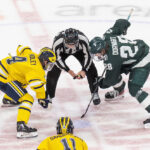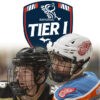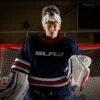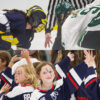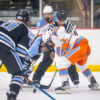“When you get out there, your disability does not matter – it’s only what you are capable of on the ice.”
That was one of the things Derek Donet had to say when talking about the upcoming Try Sled Hockey for Free event that his Belle Tire Sled Hockey program is hosting at the Taylor Sportsplex on Sept. 30.
Donet encourages anyone who has ever had an interest in trying hockey to come to the Try Sled Hockey event, which takes place at Belle Tire’s home at 1 p.m. this Saturday. It can be a life-changing experience for an aspiring athlete of any age – a journey Donet and his daughter have been on for the past seven years.
I started getting into it when my daughter wanted to play,” Donet said. “We found out during her pregnancy that my kid was going to be born with spina bifida, and hockey was already a passion of mine. It took us about five years before we actually found a recreational team to start with, out of Livonia. So when she started, she was 5 years old, and she’s turning 12 soon – she has stuck with it, and that’s how I started.”
As their passion for sled hockey grew, the Donet family ended up leaving the recreational program in Livonia to start a competitive team at Belle Tire. Entering this season, Belle Tire is the only competitive sled team in Southeast Michigan, after the Michigan Sled Dogs adult team moved to Fraser to Taylor
Belle Tire is just one of two competitive sled hockey programs in all of the Great Lakes State alongside the Grand Rapids Sled Wings.
The Belle Tire Sled Hockey program offers opportunities at all age groups and skill levels.
“Anyone is welcome to participate with our team,” Donet said. “Our goal is to make hockey accessible to everybody, regardless of disability or financial situation or anything like that. We try and make things as easily accessible for absolutely everybody.”
How is sled hockey different than stand-up hockey? Donet said aside from no backwards skating (though some players on the U.S. national team are doing it), there’s not much of a difference between the two.
“Everything for the most part translates. There has been a little bit of adapting that we have had to do – one thing is the endurance level is entirely different at the sled level. You’re not out there for 30-second shifts, you’re out there for three, four minutes at a time. Some kids at the junior level will skate the entire game and never come off the ice. There are things that are different, but the overall structure of the game, the way it’s played, the way you want to play it, it all translates very similarly to stand-up hockey.”
Thirty sleds are available for people interested in trying sled hockey on Saturday – Donet said they can easily be adjusted to fit anyone’s needs. The leadership group just wants as many people as possible to get out on the ice and try it, to “take them out for a lap or two and just get the feel of it.”
While it’s a unique experience and unique event, Donet does stress that sled hockey is a real sport, with real competition and real opportunities for advancement.
“If you want to come out and try something different,” he said when asked what his sales pitch for the Try Sled Hockey event would be. “We don’t consider this a charity event by any means, this is one of those opportunities for anybody to – this is a weird way of putting it – but for anybody to feel normal. When you get out there, your disability does not matter – it’s only what you are capable of on the ice. It is a competitive sport. There is physical contact on the ice. There is hard skating. There is a progression to it – if you have the goal of making it to the national team, there are ways to get there. It’s not charity T-ball, it’s a legitimate sport, and we try to get as many people involved in it because we understand the benefits of it, especially for disabled people. The stats are there…you are much more likely to have employment as an adult if you are involved in sports. You’re learning not just the hockey skills but you’re learning leadership skills, you’re learning teamwork, you’re learning social skills – there is so much involved in playing the sport that can prove to be even more beneficial than playing for the disabled community.
“All ages are welcome, we’ll have gear for you, everything needed to get on the ice and give it a shot. We will have helpers on the ice, we will run through a couple drills to show everybody what practices are kind of like, and if they’re interested we’ll sign them up for the season.”




